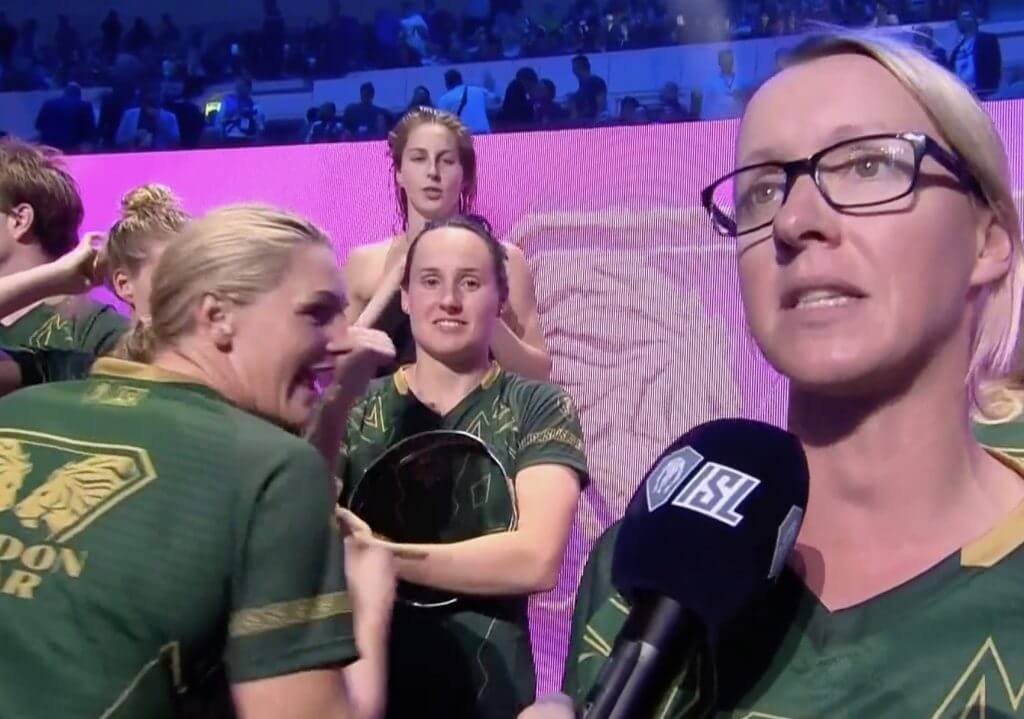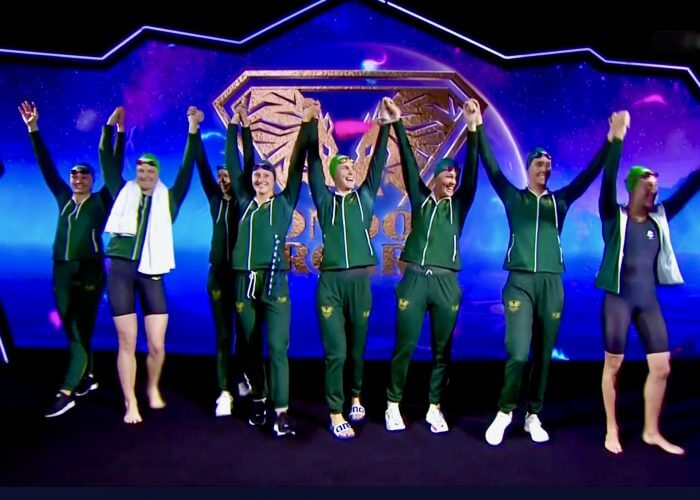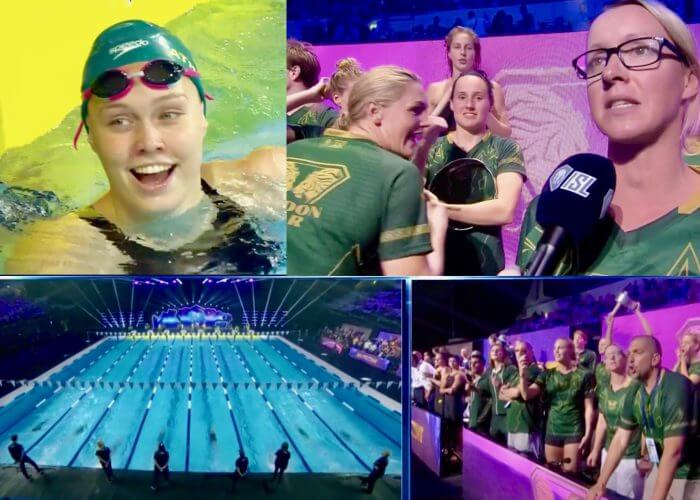Marshall-ing London Roar As It Builds A Lion’s Share In Hunt For Ticket To League Showdown

London Roar’s Lion’s Share Is About To be Fought Over at League’s European Derby
London Roar, Energy Standard, Team Iron and Aqua Centurions will battle for the last two tickets to the International Swimming League Final-Match showdown in Las Vegas on December 20-21. The Roar enter the Lion’s den at the London Aquatics Centre this weekend as the standout squad of the inaugural League season so far, with Minna Atherton, her world record over 100m backstroke, Cate Campbell, Kyle Chalmers and Adam Peaty among leading pace-setters. Swimming World caught up with Mel Marshall of late to ask how it came together, what the League has brought and what happens next (with thanks for the contribution of journalist Sabrina Knoll).

London Roar roaring…
Take all results of every round of the International Swimming League so far and overlay them on a chart of possible outcomes at the European Derby in London this weekend and the Roar have it. Add up all the 1st, 2nd and 3rd best efforts of all European teams in ISL racing so far – and apply a double and a triple score to relays and skins respectively – and the Roar has a tally two-thirds as large as the combined force of Energy and Iron. Impressive.
Up for grabs in London, one of the two Pro-Team tickets to Las Vegas for the season showdown. Two teams will watch from afar and make plans to raise their game for next year. It’s a fast game getting faster, Atherton and the women’s backstroke events cases in point.
The form-guide gold in the green team of Brits, Aussies and others who have made the Roar Europe’s winningest squad so far this season, reflects the strength of team recruitment and strategy.
Strategy is about to become the most important its been since the first meet in Indianapolis in early October. Energy and the skins strength of Sjostrom, Heemskerk, Manaudou and Proud to the right; Iron and Kromowidjojo, Morozov and the multi-eventer captaincy of Hosszu to the left; the best of Centurions trying to split the difference with top-point-score performances that can change the dynamic and outcome of the match.
All of which makes clear that the clarity of the crystal ball is keenest when it becomes redundant: down to the day, the hour, the minute, the moment, everything to play for, all outcomes possible.

London Roar celebrates mauling the opposition – Photo Courtesy: ISL
When we caught up with Mel Marshall, head coach to the Roar and mentor to Olympic 100m breaststroke champion Peaty, she was asked about the importance of the League heeding the views of athletes and involving them in the process of putting on a professional show in which they are the prime asset.
Marshall looked beyond the positivity of Season One to a time when Season Two is in the making after a “critical” moment of quality review, one advocated by Swimming World after the very first ISL meet. Said Marshall:
“I think that the key to any successful project is the quality of your review after your first attempt at it. And I think that in the sense of what needs to happen from this point is, again, the athletes, the sport, the experts, the coaches need to be listened to … If this journey with ISL is about the sport and about the athletes in it, the review that happens beyond this should have a heavy amount of information from those people. The quality of the review that happens from this point is really critical.”
An Interview With Mel Marshall:
SW: How do you put together a team for something that’s never been there and you basically have the whole world to pick from?
MM: I think you start with performance. So you look at who’s the best in the business at which event and then you look at who you can get access to. I worked really closely with Rob Woodhouse and Peter Bishop and David Lush to pull together the team. Rob has been key with his Australian contacts. But, yes, we started with performance and then just went out and reached out to who we could get to bring this team together.
“And that’s where we started. So: who’s the fastest? Who can we get access to and try and pull together the quickest team on paper.”
SW: You obviously did a pretty good job. How happy are you with the team you put together?
MM: When you see on paper a group of human beings, obviously you never know how they’re going to gel as a team and but they’ve gelled so well. I think that’s what’s lifting the team. At the first meet the coaches did a really good job on team building and we had two really good team captains in Sydney and Kyle, they really set the precedent for how the team wanted to get together.
“They’ve been on the road together now for two weeks and so they’ve got bonded and really gelled. I’m just trying to carry on the baton now and then take them all in to London. They’re a really great group of people. I think, because the standard is so high, nobody wants to drop in terms of that level. So there’s the pressure of not letting the team down, but also the standard of the person on the team is so high it pushes everybody to get better and faster.
SW: You said there’s the paper and then there’s the person. Is it advantage for James Gibson to have most of his Energy Standard team training together for all or much of the time, for him to be working closely with athletes he knows well, knows exactly, for example, when one swimmer looks tired or how far he might be able to push them at any particular moment?
MM: I think it’s about doing your research and having good conversations with their coaches or them as people. We’ve asked some of the athletes to give us a gauge of where they are. And then we’ve made decisions based on that, putting trust and ownership onto them. And again, they don’t want to let the team down, so they’re not going to be dishonest with us.
“I think you will always have an advantage if you spend more time with them. But also, if you’re really clear with your communication, you ask the right questions, you can fast track yourself. What people fail to do sometimes is ask the right questions. But I’m really proud of the coaches here, we have asked the right questions from the start. And we’ve done a really, really good job on getting to know the team and seeing what they’re capable of. And again, trusting the athletes to make some decisions.”
SW: We’ve all seen how important relays and skins are. What else did you learn?
MM: It’s about knowing your individuals and what they are capable of. So if you’ve got someone that can multi-event, and they can go back to back within these two hours than you make that selection. But if you know there’s more points in the skins over the points in particular individual event, you sometimes will make the call to sacrifice one event to probably get some more points. And we’ve had quality conversations after each match and with our coaching group, we would sit down with the manager and go through everybody in terms of those choices.
“You look at form on the day and you have a couple of options in your back pocket to make changes. Again, it’s all about the long term, two and half hours. How do you maximize your points? Sometimes you will risk something for a bigger award later down the line.”
SW: For some coaches, this time of the season might not be what they think of as the best to travel and compete. Instead they’d rather have the swimmers grinding out the metres in the pool and lifting weights. Why is this a good thing to do all these meets?

London Roar on the prowl (clockwise from top left: Minna Atherton, Mel Marshall and some Pride members; and Marshall, Fred Vergnoux and coaching staff celebrating win after win
MM: “For me, the winter is about hard work. Sometimes the hard work can be a bit dark because there’s no kind of like little affirmation of your hard work. So I looked at the program and for Adam it’s perfect. We did a really good seven weeks. So he’s tired, he is fatigued, and he’s having to then put himself into that championship mode. And then they come back from championship and we’ll go back and do another three weeks work. Then we go into London again, he has to put himself under pressure again. Then we have got another three weeks – pending the qualification to Vegas. So for me, we get the training load and volume through in the winter.
“He has to deliver results in an event that he’s not that familiar with. It’s not his strength, short course, we know that. But he’s put himself under that pressure, to be able to deliver anytime, anywhere, any place under fatigue.
“And so for winter preparation, when I saw this come available this year, I actually was really excited about it, because it means you’re not just waiting all the time for summer. You’ve got a winter training block that’s actually got some really, really quality racing in it.
“And it’s fun, it’s in a team environment and it’s different and it’s pressurised. So it’s perfect, really. The travel is a challenge. But again, with things that we’ve got now in terms of the physios, in terms of self management strategies, you know, athletes can travel through this winter block as long as they look at themselves in between.”
SW: One of the key arguments of swimmers in support of the ISL was that they finally felt as though they were being taken seriously, that they had been asked what they thought and then their views listened to. They felt their opinions mattered. That mood prevails. How important do you think that will be to the League?
MM: “I think that the key to any successful project is the quality of your review after your first attempt at it. And I think that in the sense of what needs to happen from this point is, again, the athletes, the sport, the experts, the coaches need to be listened to. If this journey with ISL is about the sport and about the athletes in it, the review that happens beyond this should have a heavy amount of information from those people. The quality of the review that happens from this point is really critical.”
As for the first season of the League, Marshall said: “They’ve done really, really well in the short space of time to pull the events together as well as they have. From an athlete’s point of view, a coach’s point of view, it’s an amazing event to be part of. When I watched it on TV the Dallas weekend, I though it was really good to watch.
“But I think the blend of ‘how can we get the times but keep the event about the points’ is [important]. It’s about having that visual contact. And I think that, again, from a review, if it can be asked from athletes, coaches and people that are involved, what is the best thing to make this an even more visual experience for the watcher and the viewer, then all the better. There’ll be plenty of ideas from a wide range of people for that to happen.”




